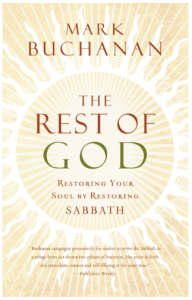Gleanings from The Rest of God
AMIA Communications
 Through modern eyes, Sabbath may seem like an antiquated concept that’s impractical or burdensome in light of the many responsibilities and demands of life. To those who grew up with strict rules about Sundays, the idea of Sabbath may come with baggage and weighty expectations, and to others it may seem foreign or cumbersome. But, as Mark Buchanan compellingly argues in The Rest of God, Sabbath is not only relevant for all of us as followers of Christ but also desperately needed.
Through modern eyes, Sabbath may seem like an antiquated concept that’s impractical or burdensome in light of the many responsibilities and demands of life. To those who grew up with strict rules about Sundays, the idea of Sabbath may come with baggage and weighty expectations, and to others it may seem foreign or cumbersome. But, as Mark Buchanan compellingly argues in The Rest of God, Sabbath is not only relevant for all of us as followers of Christ but also desperately needed.
As Buchanan explains, Sabbath is both a day and an attitude. While numerous practices can help us receive God’s blessing of rest, it’s vital that we also embrace a Sabbath mindset, which makes it possible to experience this gift:
“A Sabbath heart is restful even in the midst of unrest and upheaval. It is attentive to the presence of God and others, even in the welter of much coming and going, rising and falling. It is still and knows God even when the mountains fall into the sea. You will never enter the Sabbath day without a Sabbath heart.”
God modeled the Sabbath by taking a day of rest after six days of creation, and he commanded his people to likewise cease from their work for 24 hours each week. And, throughout Scripture, he instructs us to have an attitude of Sabbath as we trust him to meet our needs and find our peace in him. But how do we live out the Sabbath, as both a day and a mindset, in our modern world?
Below are six key takeaways from this insightful and compelling book that invites God’s people to accept and revel in his gift of Sabbath.
Sabbath and leisure are not synonymous. Buchanan writes, “Leisure is what Sabbath becomes when we no longer know how to sanctify time. Leisure is Sabbath bereft of the sacred. It is a vacation—literally, a vacating, an evacuation.” As he explains, mere leisure is one of the biggest obstacles to Sabbath; it’s an escape that leaves us unsatisfied. Sabbath, in contrast, fills us, adding richness to our time just as being with someone we love refreshes us for the hours that follow.
Sabbath requires trusting in God’s sovereignty. It’s an act of faith as we entrust ourselves and our unfinished business into his care. Until we truly believe that the Lord is big enough and good enough to handle the things we must set aside to rest, we’ll view Sabbath as too great a risk.
Sabbath involves living in the freedom God gives us. Drawing from Deuteronomy, Buchanan demonstrates that “Sabbath is a refusal to go back to Egypt.” He explains, “To refuse Sabbath is to resume willingly what we once cried out to God to deliver us from.” Unlike slaves, who lack the liberty to rest, we have freedom to slow down and step away from our work.
Sabbath is a gift. Despite the pervasive lie of our inner taskmasters—that we can’t stop until the work is done—rest is not a prize we earn for finishing a task or a reward for a job well done. It’s a gift God calls us to receive amid our work.
Sabbath provides space to listen to God. As Buchanan points out, “we can be very busy for God and still not know him.” As other demands for our attention are set aside and silenced during Sabbath, we are able to tune our ears to the Lord’s voice. “If we don’t listen, we never enter his rest. Yet, if we don’t enter his rest, we never listen.”
Sabbath allows us to remember, reflect and anticipate. In the stillness of Sabbath, we’re able to see who we really are as we recall the past through clear eyes and look upon the parts of our souls that otherwise remain hidden. And, because Sabbath is a foretaste of heaven, we’re prompted to joyfully await the true rest found in the presence of God in eternity. As Buchanan writes, “This present Sabbath is only a shadow of another Sabbath. … Earthly things suggest it but never fill it.”
To help readers practically apply a Sabbath attitude, Buchanan ends each chapter with a suggested “Sabbath Liturgy”—a practice that allows us to intentionally cultivate this mindset. Liturgy, he says, “breaks open the transcendent within the ordinary and the everyday. It lets us glimpse the deeper reality—the timeless things, the universal ones, the things above—in this particular instance of it.” He later adds, “It lets us render thinking into doing, to pour knowledge through our limbs.”
Buchanan’s proposed liturgies include:
- Practice the sovereignty of God by beginning prayers for help with proclamations of what he’s done and who he is.
- Acknowledge God’s presence and greet him, audibly or in your heart.
- Choose one of the questions Jesus asks in the Bible (such as “Why do you call me good?” or “Who do you say I am?”), and ask it of yourself.
- Practice the prayer of examen, for example, asking yourself at the end of each day, “Where did I feel most alive, most hopeful, most in the presence of God? And where did I feel the most dead, the most despairing, farthest from God?”
Liturgies like these, combined with a transformed mindset, pave the way to enjoy God’s gift of Sabbath and joyfully anticipate the everlasting rest that he is preparing for us. As Buchanan states, “A well-kept Sabbath is a dress rehearsal for things above.”
Thomas Nelson Publishers











